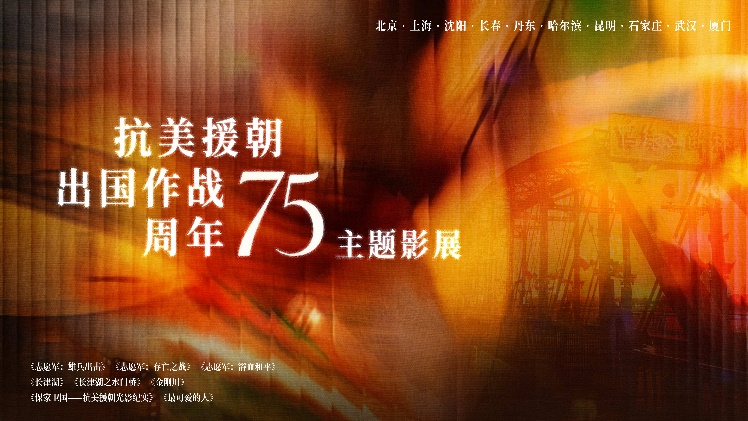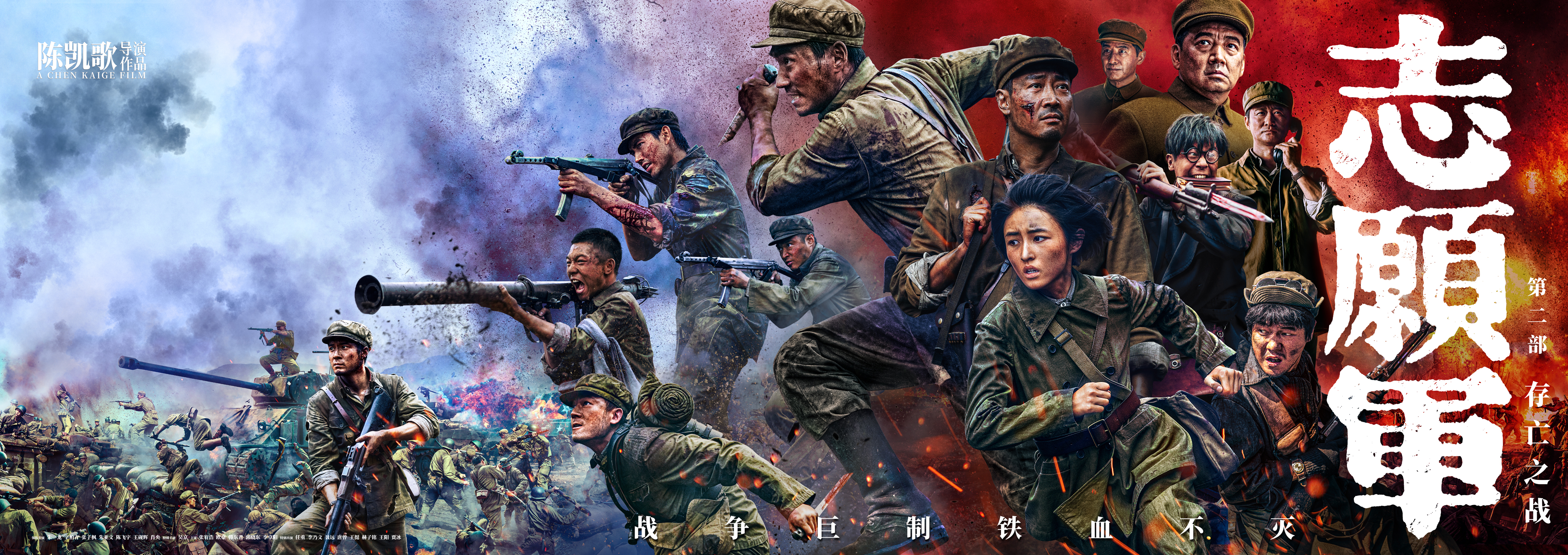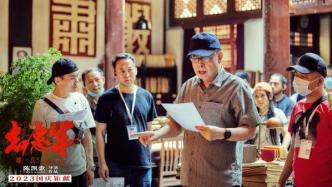
On September 28, the movie "Volunteers: Heroes Attack" directed by Chen Kaige was officially released.
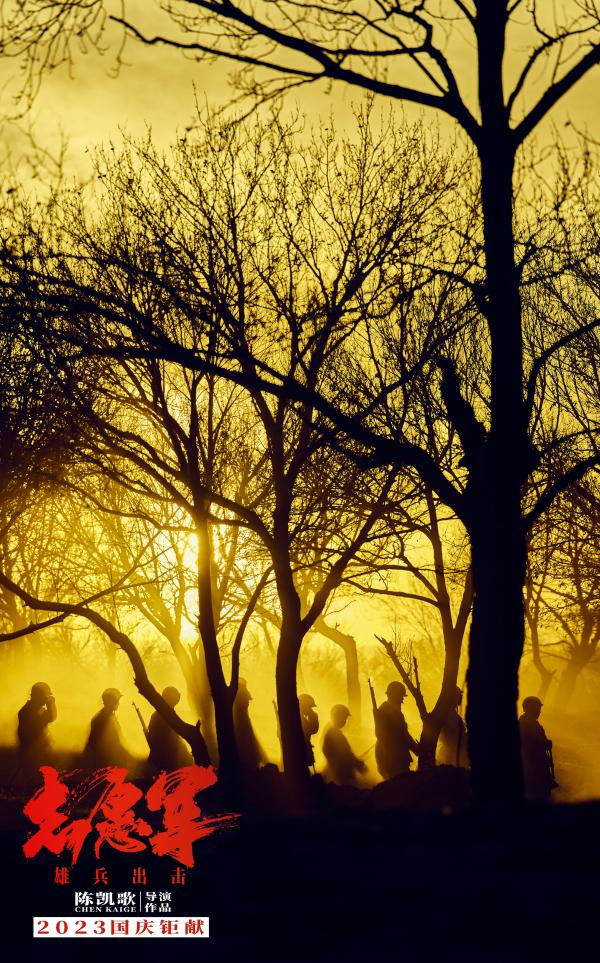
"Volunteer Army: Heroes Attack" poster
The War to Resist U.S. Aggression and Aid Korea was the "war of founding the country" of New China. In 1950, in order to safeguard peace and gain long-term stability for the motherland, the Chinese military and civilians were united and began the three-year War to Resist U.S. Aggression and Aid Korea. 70 years have passed so quickly, and many people who experienced the war personally are no longer alive. For the younger generation, "volunteer army" seems to have become a vague concept in books and ears.
The movie "Volunteer Army" aims to pay tribute to the "cutest people" and the ancestors who dedicated their youth and lives for the motherland through images. Director Chen Kaige said: "I hope that the meaning of this film can make young people aware of that era, and also allow young people to understand and recall the contributions made by volunteer soldiers in the historical context of that time. .”
"Trilogy" presents a panoramic, multi-dimensional and larger scale to resist U.S. aggression and aid Korea.
Chen Kaige knows very well that this is not the first time he has filmed the subject of resisting U.S. aggression and aiding Korea, and there are also examples where the pearls and jade came first. "But this time, the difference between us and other films is that we have to make a panoramic, multi-dimensional, and larger-scale film that presents the War to Resist U.S. Aggression and Aid Korea. This is actually very difficult. In addition to being able to Apart from finding a large amount of international information on the War to Resist U.S. Aggression and Aid Korea, there is no novel text that we can learn from and refer to, so we have to do research and thinking in all aspects, and in this process, structural design is always the most troublesome issue."
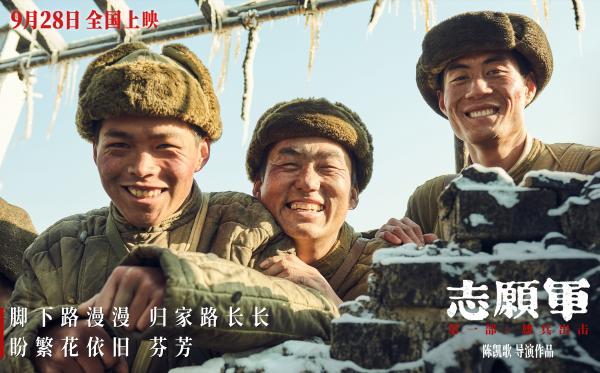
"Volunteer Army: Heroes Attack" stills
"So in the final analysis, unlike other films about the War to Resist U.S. Aggression and Aid Korea, our creation this time must not only have large-scale historical scenes, but also integrate the fate of individual characters. Only when fate and historical facts are blended together can we Only when the time comes can a very huge explosive power be produced." Chen Kaige said that the initial idea was to make two parts, but in the end he decided to make a trilogy.
"To a large extent, this is because when the story unfolds, the layout of the two parts cannot accommodate all the content. For example, we will show the five battles, the difficult decisions of the leaders, and the grand scenes of the Chinese People's Volunteers going abroad to fight for the first time, including the entire part The characters covered in the film, from leaders to unknown warriors, all require the cooperation of multiple actors. After deciding on the basic concept, you will also encounter various practical problems in managing such a huge project. A crew that kept the entire crew running efficiently like a heavy machine. We shot for 13 months, which is actually very rare in film history."
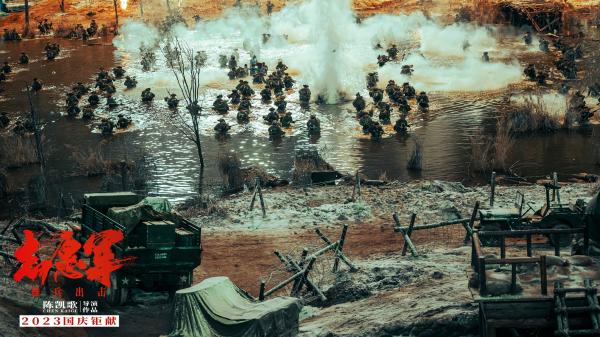
"Volunteer Army: Heroes Attack" stills
The first work of the "Trilogy", "Volunteers: Heroes Attack" tells the general situation of the international game, because it was at a time when the country had just been founded and everything was waiting to be revitalized. Under the influence of the years of war, there was an urgent need to recover and recuperate, but the threat from foreign enemies It is unavoidable, so based on this historical basis, the decision to fight abroad to resist U.S. aggression and aid Korea was finally made. "From the time when the Volunteer Army sent troops to cross the river and won the first battle at Liangshuidong, to the 38th Army's attack on Sansuoli in the second battle, the blocking battle at Songgu Peak and the liberation of Pyongyang, all the generals and soldiers, as the main body of the battle, have made great contributions. It is a spectacular contribution in the history of war. Under the canopy of history, we see these battles really shine with a very brilliant light."
In the second film of the sequel, the overall attention turns to the 63rd Army of the Volunteer Army, and the focus falls on the Cheorwon Blockade, which was a key battle in the War to Resist U.S. Aggression and Aid Korea. It not only provided new insights into the combat capabilities of the U.S. military. The assessment also strengthened the determination of the volunteers to hold their position and persevere to the end. The third part of the final chapter is about fighting and negotiating at the same time. While presenting the important historical facts of the war, it also infuses emotions and gives the characters a complete ending.
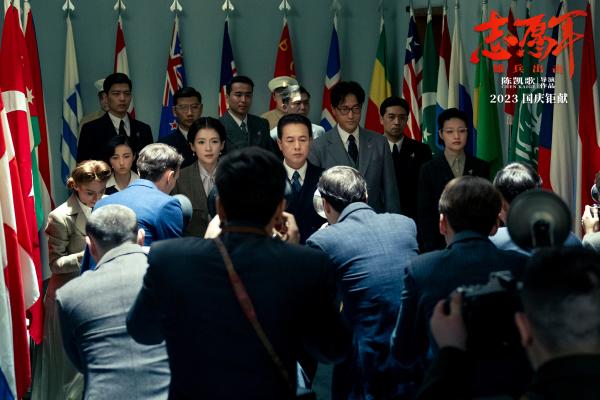
"Volunteer Army: Heroes Attack" stills
Compared with previous films of the same type, one of the story highlights of the "Volunteers" trilogy is that it sets up two clues of battlefield combat and diplomatic fronts. Choosing Wu Xiuquan, a veteran general and revolutionary who has experienced many legendary events, as the head of the delegation represents China's position and makes the Chinese people's own voices heard to fight back forcefully.
"In the final presentation of this scene, whether it is the actors' performances, demeanor, action styles, or the entire United Nations Security Council scene, it is actually a restoration of history compared with the documentaries of the time. Compare the English nameplate of the People's Republic of China The details on this are also intended to express that diplomacy is no small matter and all matters must be accurate, and I also hope to make these people present feel proud that we represent a brand new country." Chen Kaige said.
There are many characters, both real and fictional characters.
There is no doubt that in order to present a panoramic view of the "War of Founding" to resist U.S. aggression and aid Korea, there must be many historical figures appearing in the "Trilogy". Among them, Peng Dehuai, as the commander of the Chinese People's Volunteer Army, has made huge military contributions. "At that time, when the Korean war situation was very chaotic, Peng Dehuai, as the commander-in-chief, had a thorough understanding of the overall situation, saw the possibility of annihilating the enemy on the move, and was willing to risk his own life to take the lead in understanding the situation of the war."
"And our leader and general is also very popular. He has his own way of being happy and his own way of being sad, including that in ordinary life he looks like an ordinary person and is amiable. That is, he will get everyone's emotional support. For example, when Deng Yue led the 118th Division to arrive at Zhisi first, his child-like reaction, and the action design of his body slumping down after learning that Mao Anying died, can be seen in his performance. The emotion of that moment.”
"Looking at MacArthur and Ridgway, they did not smile. They showed arrogant and defiant American values, including the arrogant attitude of the American generals at that time who regarded the Chinese army as nothing. We can see the contrast in the personalities of the Chinese and American commanders. "Chen Kaige said.
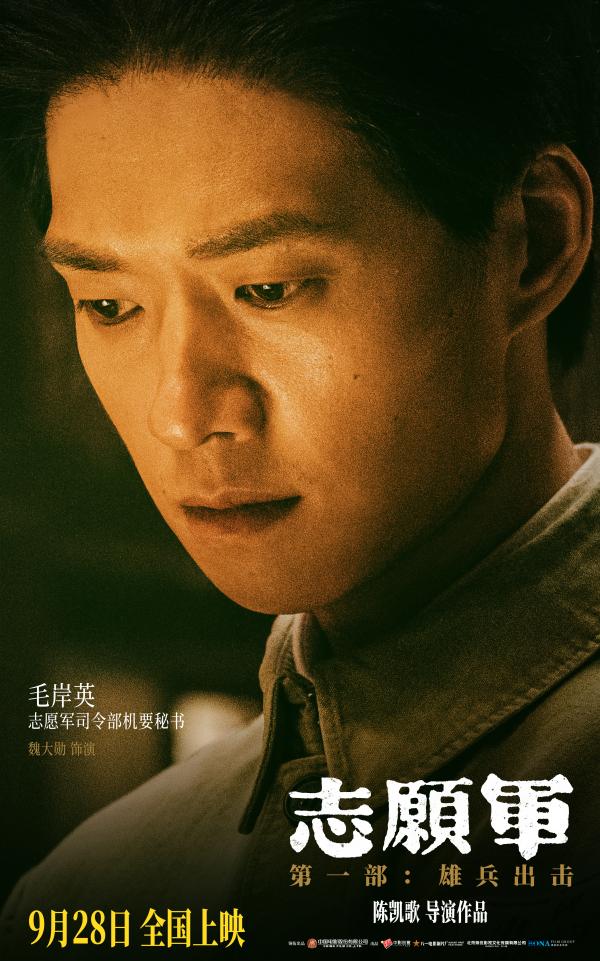
Wei Daxun as Mao Anying
In Chen Kaige's view, Mao Anying's fate was very bumpy. "He was born in 1922. When he was 8 years old, his mother was killed by the Kuomintang. After being sent to Shanghai, one of his younger brothers became ill and another brother was lost. After the party organization was destroyed, he took his younger brother to give birth to children on the street. He did all the things that a street kid would do, like cleaning shoes. Later, when he was sent to the Soviet Union, he encountered the war. When he returned to his father, he had completely lost the opportunity to grow up with his parents. So I think While he admired his father very much, he also felt a certain sense of unfamiliarity, so he designed a scene where he looked at each other through the window and said goodbye silently before leaving."
War is cruel, but it never lets women go away. Talking about the three female characters with different personalities in the film, Chen Kaige said, "Li Xiao, played by Zhang Zifeng, is a character throughout. In the first film, she appears at the United Nations; in the second film, she is actually the main character. The daughter and sister of the family united the family relationship from different directions in the Korean battlefield. The famous obstetrician and gynecologist Lin Qiaozhi was the "mother of ten thousand babies". She herself was not married and had never given birth, but she brought countless babies to her. The child was brought into this world as a symbol of motherhood and peace. Tang Sheng, played by Zhang Ziyi, is a representative of overseas Chinese women. Her experience of simultaneous interpretation at the United Nations Security Council made her finally choose to return to her country. These three The women vary in age, but I feel like they’re all an important part of the fabric of the story.”
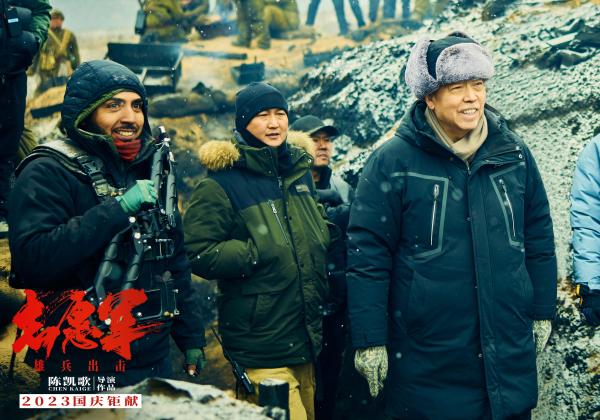
Director Chen Kaige on the set of "Volunteers: Heroes Attack"
After the film was released, senior staff officer Li Moyin played by well-known actor Xin Baiqing and Wu Benzheng, a returned military expert played by Zhu Yawen, were equally impressive. Talking about these two fictional characters, Chen Kaige said, "Because there have been many troops going to fight in North Korea in history, if the presentation is cut into short sections, it will be difficult to connect the stories to a certain extent, so relying on a certain basis .Li Moyin undertakes two very important tasks in the play: first, he builds a family, which is where our emotions are sustenance; second, Li Moyin is ordered to go to the Korean battlefield, and he goes deep into the front line to deeply understand the entire situation of both the enemy and ourselves. The comparative status of troops, morale, weapons and equipment, and learning new strategic tactics from modern warfare, and therefore will be continuously sent by the headquarters to different units to understand and implement various aspects of the situation, and appear in different scenarios."
Wu Benzheng’s design answers realistic questions with a skeptical voice. "The decision to go abroad to resist U.S. aggression and aid Korea was made in a relatively short period of time. Faced with many real difficulties, there were also many opposing voices and opinions. Wu Benzheng said from the perspective of a patriotic person with a background in foreign weapons manufacturing and study abroad. Some different views: The first point is that war is not only conducted on the ground, but also in the air. Air supremacy is the core of winning modern war; the second point is what is the basis for ensuring that the battle with the US military can be won? Wu Benzheng's original role image He was a skeptic, but when he went to North Korea and actually participated in the war, his mentality changed."
"I write my heart with my hand", the pine tree symbolizes the integrity, standing and bravery of the warrior
Talking about the methodology of this creation, Chen Kaige believes that the director's job should be to understand these characters first before the actors. "First make these characters in your mind like clay figures, and then convey your feelings to the actors. In other words, the director is a conductor between the characters and the actors. I convey this current to the actors through myself. Actor. At the same time, this is also a very interesting thing. Sometimes when communicating with actors, we talk about how to act and how to deal with it. I think it is a very good phenomenon. And when it comes to selecting actors, my method is actually very It’s simple, just meet them. No matter how big or small the role or actor is, it doesn’t matter, just meeting them can help me judge. For so many years, I have always adhered to a standard of who is suitable and who should be cast."
"I write my heart in my hand." Chen Kaige has been engaged in film and television creation and still insists on writing with a pen. "Only when the pen is connected to the heart and the words can we write good things. So I have always maintained this habit and like the feeling of writing on paper. I also wrote many books for the play "Volunteer Army", such as storyboards, plans, Reflections, rather than being a notebook, it is better to use the notebook as an interlocutor, into which you can put some of your own creative ideas, basis, data, etc.”
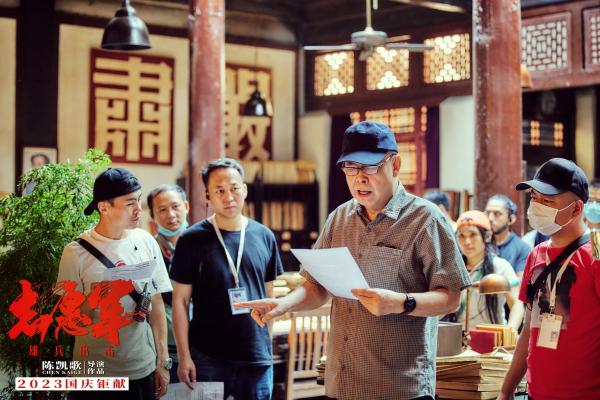
Director Chen Kaige on the set of "Volunteers: Heroes Attack"
Talking about the important scene in "Volunteers: Heroes Attack" and the spiritual significance of the battle on Songgu Peak, Chen Kaige was filled with emotion: "The phrase 'The Three Companies on Songgu Peak has been remembered by New China and the Chinese people' The line is actually intended to tell today's young people through the movie that the most lovable people in Wei Wei's works are the soldiers of the Third Company. We use movies to complete the exchange of passion and facts, convey the indomitable spiritual power, and the people's morale and desire. Transform the defense of the country into the will of the people."
"Heavy snow weighs down the green pine, and the green pine stands tall and straight." At the end of the film, almost all the officers and soldiers of the Third Company died on the Songgu Peak position, and only one green pine still stood proudly against the frost. "There is no record of this pine tree in history, but the pine tree is a symbol of bravery and perseverance in our cultural connotation, just like Marshal Chen Yi's famous poem. So we planted a pine tree there until the filming was completed. , the pine trees are still living there. In history, Songgu Peak was not a very majestic mountain, but such a name will make people feel that it embodies the integrity, standing and bravery of these warriors. So I hope to visualize it, There must be a tree on this hillside, a living tree that has gone through the war with these warriors."
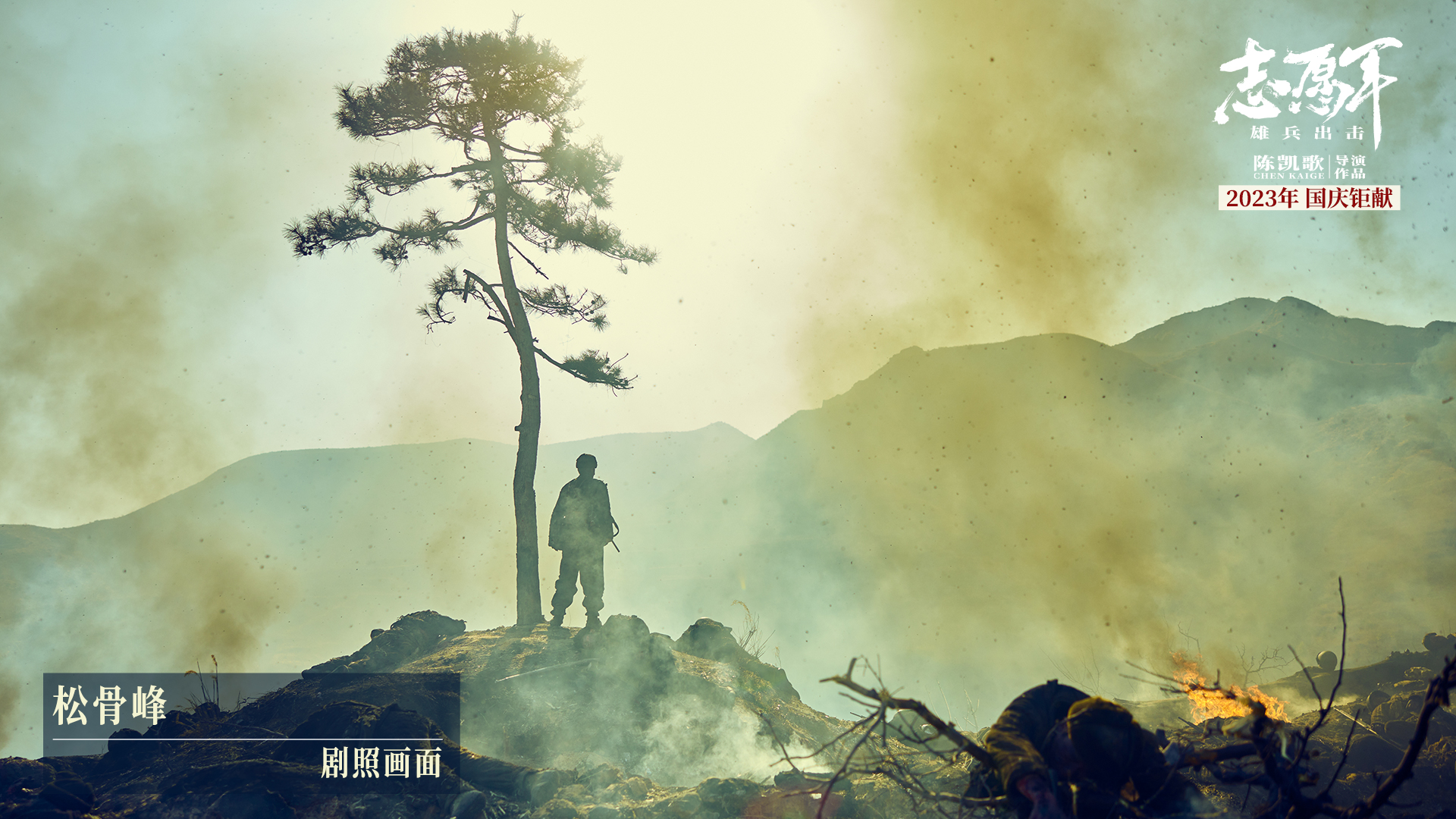
"Volunteer Army: Heroes Attack" stills
"For those who have great ambitions to sacrifice, they dare to teach the sun and the moon to change the sky." Chen Kaige expressed his views on the sacrifice scenes in the film: "Striving for peace through war is the fundamental purpose of the Chinese People's Volunteers going abroad to fight. Chairman Mao also said in his article that there will be sacrifices if you struggle. This is a fact. At the same time, "I have no idea how much sacrifice our hundreds of thousands of troops will make without the cover of the Soviet Air Force." I have hesitated, it’s not that I haven’t considered it.” In the film, Chairman Mao actually talked about his worries. Therefore, we must have a rational understanding of war and must not praise the sense of unnecessary sacrifice. It expresses our attitude towards this matter.”
"Liang Xingchu, commander of the 38th Army, said, 'I want to be prepared and fight again when I am ready, and I want to reduce casualties as much as possible.' This is our attitude, including President Peng who said, 'We live in this era, and sacrifice may be This is the price we have to pay.'" Chen Kaige wanted to emphasize that the soldiers who sacrificed at that time were actually very young. In a sense, the audience watching this movie today may be about the same age as the volunteer soldiers more than 70 years ago. . "So I hope that the meaning of this movie can make young people aware of that era, and also allow young people to understand and recall the contributions made by the volunteer soldiers in the historical context of that time."
